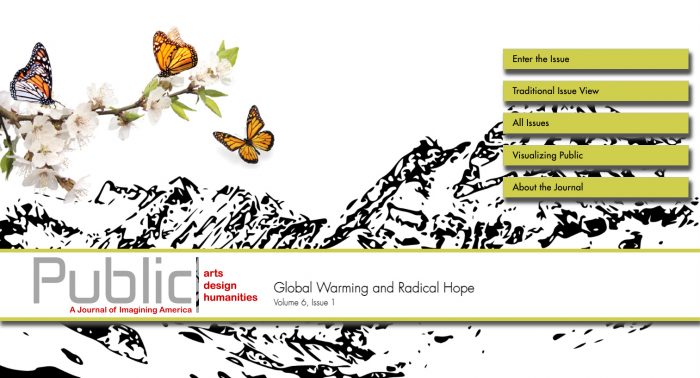Global Warming and Radical Hope
We are not scarcity.
We are multitudes.
We are generations.
We are but part of all living.
We can thrive again
…when we slow down and take notice.
We can all be mother(ing) earth—“the practice of creating, nurturing, affirming and supporting life.”1 (Thank you Alexis Pauline Gumbs channeling Walt Whitman.)
This special issue started out as panic.
What have I not been doing?#!
It’s been a process of “learning by doing” and reflecting.
“Global Warming & Radical Hope” experiments with reimagining what an online journal can be—one that advances thinking and reimagining together as a network collaborating with generous criticality and being the change we want to make—we must make.
The five source texts we’ve started with serve as a beginning point to understanding this ginormous “hyperobject” of global warming that is now linked to the cascading impact of the zoonotic-linked wild more-than-human COVID-19 virus. The scale is so out of our common culture’s imaginative parameters that time and space have become too abstract for our everyday lives. The living planet going through phases of human-precipitated global warming is now spawning collateral “tipping point” consequences when equilibriums become imbalanced.
We can all thrive.
We are not scarcity.
We are but part of all living.
We are multitudes.
We are generations.
This nonconventional issue of PUBLIC takes on this outsized challenge. We must go beyond the eight blind men and the elephant parable—common human senses are not designed to be sensitive enough and to gain perspective enough on this hyperobject. Certainly, science and technology, big universities, big government, giant multinational corporations, giant tech, driven by ever-growing profitability have reached a cannibalistic stage. We’re eating our young. Extreme profits for fewer and fewer are wrecking the planet on an unprecedented scale and speed.
Adding to these collapses, the public trust in the US, from where we write and design, is so fundamentally divided that any feeling of shared human purpose undergirding this republican democracy seems too brittle and elusive to respond to the UN’s IPCC Clock. The material, cultural, and spiritual commons that has for so long been a place of fugitive refuge has become so fractured and privatized we have little sense of who a “we” might be.
With a commitment to creative nonfiction, really to public history, public science, but actually public scholarship, this issue of PUBLIC poses this outsized XXXXLLLL to the nth power question. Can we find an expressive design and language that approximates the scale and complexity of our living planet in order to convey the scale, the immensity, of accumulated time in all places; the nuance and precious diversity of all places, indeed, the soil itself or a drop of water; that infinity of our exterior lives but also our inner lives?
We’ve invited friends and respected colleagues to riff off of these five source texts as a starting point on how to make urgent change happen. Their responses range as widely as each of their inner-sights varies. Improvs are expressions of cross-cultural playfulness across differences. Or it’s being inspired like Carol Bebelle’s poem. This activity seems especially urgent given how our commons have become just as siloed as hyperspecialist gatherings happily nattering away in their in-group jargon. We can’t afford to be so precious.
Then, we hope this site inspires your interventions, your own riff on this riff. We want to explore how can we assemble enough creative nonfiction devotees to create our own social network of global warming mitigations, our own counter-hyperobject expeditions—each of you going off to discover a linking piece of this impossible puzzle.
In the meantime, glean quickly through these five source pieces and see what catches your eye or snags a tone or locates an elusive point. Follow links. There is no wrong way to approach this nonlinear issue of PUBLIC. Go down a rabbit hole. Slow down with just one thought. Formulate it and send it to us. Shedding the baggage of the pre-pandemic, can we “begin again” and walk through this pandemic portal “lightly, with little luggage, ready to imagine another world. And ready to fight for it.”2
If we slow down and take notice…
We are but part of all living.
We are generations.
We are multitudes.
We can all thrive.
We are not scarcity.
—Jack Tchen
Notes
1Gumbs, Alexis Pauline. 2016. “Introduction.” In Revolutionary Mothering: Love on the Front Lines edited by Alexis Pauline Gumbs, China Martens, and Mai’a Williams. Oakland, CA: PM Press.
2 Roy, Arundhati. 2020. “The Pandemic Is a Portal.” Financial Times, April 3, 2020.
